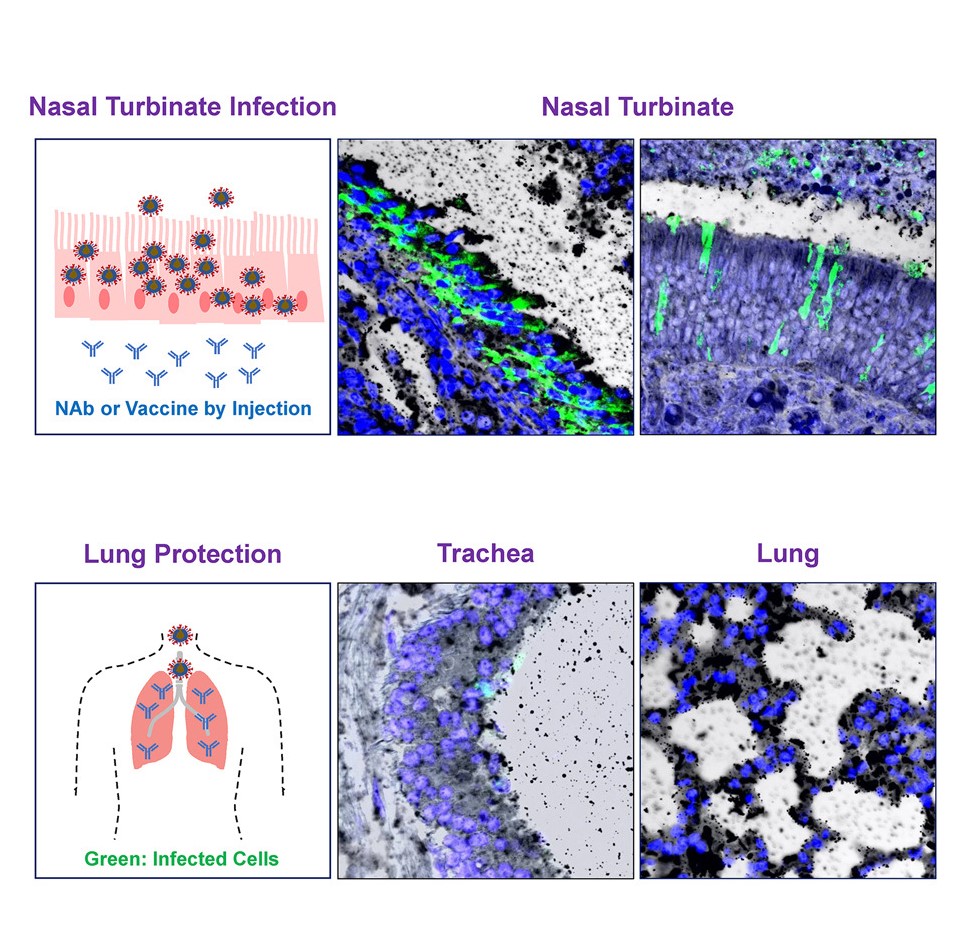04 March 2021
Researchers at the AIDS Institute, Department of Microbiology and State Key Laboratory of Emerging Infectious Diseases, LKS Faculty of Medicine of The University of Hong Kong (HKUMed), in collaboration with scientists at Tsinghua University and Columbia University, conducted a study for determining site-specific prevention of SARS-CoV-2 in nasal turbinate of Syrian hamsters by investigating systemic human neutralising antibodies (HuNAb) and a spike-based DNA vaccine. The study demonstrated that systemic HuNAb or vaccine failed to fully prevent SARS-CoV-2 infection in the nasal turbinate of the hamsters. Robust SARS-CoV-2 infection in the nasal turbinate may help the virus to evade systemic HuNAb. The original research article has now been published online in one of the world’s leading journals Cell Host & Microbe [link to the publication].
By now, COVID-19 pandemic has led to over 111 million infections and 2.48 million deaths, yet whether or not systemic antibody or vaccine would confer full protection against SARS-CoV-2 transmission and disease remains unclear. In this study, the researchers tested three potent HuNAbs against live SARS-CoV-2 infection in Syrian hamsters. These HuNAbs inhibited SARS-CoV-2 infection by competing with human angiotensin converting enzyme-2 for binding to the viral receptor binding domain (RBD). Prophylactic intraperitoneal or intranasal injection of the individual HuNAb’s or DNA vaccination significantly reduced infection in the lungs but not in the nasal turbinate of the hamsters intranasally challenged with SARS-CoV-2. Although post-virus challenge HuNAb therapy suppressed viral loads and lung damage, robust infection was still observed in the hamsters’ nasal turbinate treated within 1-3 days. These findings demonstrate that while systemic HuNAb suppresses SARS-CoV-2 replication and injury in lungs, robust viral infection in the nasal turbinate may help the virus to evade antibody and therefore contribute to subprotection and reinfection.
“It is important for the public to realise that the presence of high titer of serum neutralising antibody after vaccination or antibody therapy does not fully guarantee the protection of our upper airway from infection by SARS-CoV-2. Thus, in addition to vaccination, mask wearing and hand hygiene should still be complied in order to control the virus from spreading”, said co-corresponding author, Professor Yuen Kwok-yung, Henry Fok Professor in Infectious Diseases and Chair of Infectious Diseases, the Department of Microbiology, HKUMed.
“Several COVID-19 vaccines have been approved for emergency use, yet vaccine-induced protection against asymptomatic SARS-CoV-2 infection remains largely unsuccessful. Our findings of robust viral replication in nasal turbinate outcompeting preventive/therapeutic HuNAb or vaccine-induced HuNAb not only reveal a mechanism underlying the difficulty of full protection against asymptomatic infection but also highlight the importance of COVID-19 mucosal vaccine development,” said Professor Chen Zhiwei, Director of the AIDS Institute, Professor of Department of Microbiology, HKUMed, who led the research.
About the research team
The research was conducted primarily by Ms Zhou Dongyan, Mr Zhou Biao and Mr Li Shuang, PhD candidates, Dr Zhou Runhong, Post-doctoral Fellow, and Dr Liu Li, Research Assistant Professor at the AIDS Institute, HKUMed, and Dr Jasper Chan Fuk-woo, Clinical Assistant Professor, Department of Microbiology, HKUMed, and Miss Shan Sisi, PhD candidate, at Tsinghua University, who share the first authorship. This team is led by Professor Chen Zhiwei, Director of the AIDS Institute, Professor of Department of Microbiology, HKUMed, and Professor Yuen Kwok-yung, Henry Fok Professor in Infectious Diseases and Chair of Infectious Diseases, Department of Microbiology, HKUMed, in collaboration with Dr Kelvin To Kai-wang, Head of Department and Clinical Associate Professor, Department of Microbiology, HKUMed, Professor Zhang Linqi at Tsinghua University, and Professor David Ho Da-I at Columbia University.
This study was partly supported by the Research Grants Council Collaborative Research Fund (C7156-20G to ZC); the Health and Medical Research Fund (COVID190123) of the Food and Health Bureau, the Hong Kong Special Administrative Region Government; the University Development Fund and Li Ka Shing Faculty of Medicine Matching Fund from HKU to the AIDS Institute; Innovation and Technology Fund, Innovation and Technology Commission, the Hong Kong Special Administrative Region Government; and donations of generous donors including Friends of Hope Education Fund.
About the AIDS Institute, HKUMed
Established in 2007, the AIDS Institute, LKS Faculty of Medicine of The University of Hong Kong (HKUAI) has a long and distinguished history in HIV/AIDS education and research. Currently, HKUAI is leading the undergraduate course of Infection and Immunity for the Bachelor of Biomedical Sciences programme. HKUAI is also leading the Theme-Based Research Scheme on HIV-1 Vaccine and Cure granted by the Hong Kong Research Grants Council. HKUAI has made significant contributions through its research and advocacy to improve the health of populations and individuals in the fight against the AIDS pandemic, which led to the winning of 2019 Knowledge Exchange Awards of LKS Faculty of Medicine and The University of Hong Kong, respectively.
To promote knowledge exchange, research activities at HKUAI can be viewed through med.hku.hk/aidsinst.
Media enquiries
Please contact LKS Faculty of Medicine of The University of Hong Kong by email (medmedia@hku.hk).



Follow HKUMed